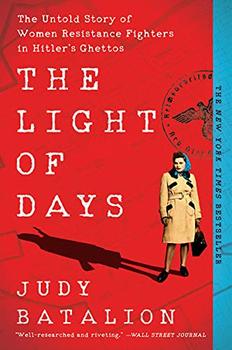Summary | Excerpt | Reviews | Beyond the Book | Readalikes | Genres & Themes | Author Bio

The Untold Story of Women Resistance Fighters in Hitler's Ghettos
by Judy BatalionChapter 1
Po-Lin
Renia
OCTOBER 1924
On Friday, October 10, 1924, as the Jews of Jędrzejów were settling in for their Sabbath eve, shutting shops, closing tills, boiling, chopping, frying, Moshe Kukielka rushed from his store. His family home at 16 Klasztorna (Monastery) Street was a small stone structure on a verdant main road, just around the bend from a magnificent medieval abbey known for its turquoise and gilded interior. Tonight the house was particularly abuzz. As sunset approached, the orange autumn light bleeding red into the lush valleys and rolling hills of the Kielce region, the Kukielkas' oven heated, their spoons clanged, their stove hissed, and the church bells formed their usual backdrop to the family's Yiddish and Polish clatter. And then, a new sound: a baby's first wail.
Moshe and Leah were both modern and observant, as were their three older children. They engaged in Polish culture and celebrated Jewish traditions. Moshe was used to hurrying home or to a shtiebel (prayer house) for the Shabbat meal and prayers, walking briskly through the open town square, with its rows of pastel-colored buildings, passing Jewish merchants and Christian farmers who lived and worked side by side. This week, he rushed even more hastily through the cool fall air. Traditionally, candles were lit and Shabbat itself was welcomed as a bride into the home, but that day Moshe had a new guest to greet. An even better one.
And then he arrived to find her: his third daughter, who immediately became the shiny apple of his discerning eye. Rivka in Hebrew, a name whose roots have various meanings, including connection, union, and even captivating. In the Bible, Rivka was one of the four matriarchs of the Jewish people. Of course, in this partly assimilated family, the baby also had a Polish name: Renia. The name Kukielka resembles the Polish Kukielo—the surname of family who for generations had run the local funeral home. Jews often constructed last names by adding winsome endings such as -ka to Polish names. Kukielka means "marionette."
It was 1924, just a year after the new Poland was finally recognized by the international community and had its boundaries set, following years of occupation, partitioning, and constantly fluctuating borders. (As the old Jewish joke went, a man asks whether his town is now in Polish or Soviet territory. He's told, "This year, we're in Poland." "Thank goodness!," the man exclaims. "I simply could not take another Russian winter.") The economy was afloat, and though most Jews in Jędrzejów lived below the poverty line, Moshe succeeded as a small businessman, running a gallenteria shop that sold buttons, clothing, and sewing supplies. He raised a middle-class family and exposed them to music and literature. Their Shabbat table, set that week by the Kukielkas' older two daughters and relatives while Leah was otherwise occupied, served up the delicacies of the day, which Moshe was able to afford: sweet liquor, ginger cake, chopped liver with onions, cholent (a slow-cooked beans and meat potage), potato and sweet noodle kugel pudding, compote of plums and apples, and tea. Leah's gefilte fish, offered most Fridays, would become Renia's favorite. No doubt, the meal was extra festive this week.
Sometimes traits of personality are visible, even unmistakable, in the earliest hours of existence; psychologies stamped on the soul. It's possible that Moshe knew when he first held her—infusing her with his gentleness, intelligence, and incisiveness—that his spirit would carry her forward on journeys a person in 1924 could scarcely imagine. It's possible he knew then that his little Renia, with the big green eyes, light-brown hair, and delicate face—his little, captivating marionette—was born to perform.
Jędrzejów was a shtetl, Yiddish for "small city," and a word that referred to Polish market towns with significant Jewish populations. Renia's birth added one to the 4,500 Jews in the village, who composed almost 45 percent of the population. (Her younger siblings, Aaron, Esther, and Yaacov, or little Yankel, would soon add three more.) The Jewish community, established in the 1860s when Jews were finally allowed to settle in the region, was largely poor. Most Jews worked as traveling salesmen, peddlers, and small business owners with shops on or around the breezy market square. The rest were mainly artisans: shoemakers, bakers, carpenters. Jędrzejów was not as modern as Będzin, which bordered on Germany and the West, but even here a small number of elite locals were doctors, emergency medical workers, and teachers; one Jew was a judge. About 10 percent of the town's Jews were wealthy and owned timber mills, flour mills, and mechanical workshops, as well as property on the main square.
Excerpted from The Light of Days by Judy Batalion. Copyright © 2020 by Judy Batalion. Excerpted by permission of William Morrow. All rights reserved. No part of this excerpt may be reproduced or reprinted without permission in writing from the publisher.
Your guide toexceptional books
BookBrowse seeks out and recommends the best in contemporary fiction and nonfiction—books that not only engage and entertain but also deepen our understanding of ourselves and the world around us.